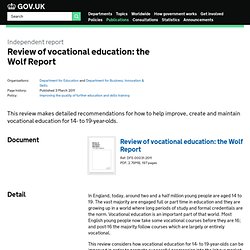

Bracknell & Wokingham College Home Page. Wolf Report. In England, today, around two and a half million young people are aged 14 to 19.

The vast majority are engaged full or part time in education and they are growing up in a world where long periods of study and formal credentials are the norm. Vocational education is an important part of that world. Most English young people now take some vocational courses before they are 16; and post-16 the majority follow courses which are largely or entirely vocational. This review considers how vocational education for 14- to 19-year-olds can be improved in order to promote successful progression into the labour market and into higher level education and training routes, and provides practical recommendations to help inform future policy direction, taking into account current financial constraints. Governement Response (Wolf Report) The Secretary of State for Education commissioned Professor Alison Wolf of King’s College London to carry out an independent review of vocational education.
She was asked to consider how vocational education for 14- to 19-year-olds can be improved in order to promote successful progression into the labour market and into higher level education and training routes. She was also asked to provide practical recommendations to help inform future policy direction, taking into account current financial constraints. This document sets out the Government’s response to Professor Wolf’s recommendations. They accept all of them, and what follows sets out how the recommendations will be taken forward. Rather than simply take each recommendation in turn, it considers her report thematically and sets out how the Government will implement not just the letter but the spirit of the report, transforming the quality of vocational education for young people in this country. CoLRiC - Peer Accreditation Scheme. Gain access to members' forums, policy documents, survey results, preferential conference rates and more.

Meetings & Events About the Scheme The Peer Accreditation Scheme was launched in 1997 to support the FE inspection framework with objective peer reviews of Learning Resources provision by professionally qualified and experienced colleagues. The reviews have a particular focus on the impact of Learning Centres on curriculum development and the contribution toward retention and achievement successes. In 2011 the Scheme went through a process of revision and the new Scheme was launched in Spring 2012. Details (presentation given at Liverpool Roadshow June 2012) Further details (special edition of the CoLRiC Newsletter) The benefits of accreditation How does it work? Trained CoLRiC Assessors visit the college and evaluate the quality and impact of the Learning Resources Service using a constructed standard of an excellent service. More about the Scheme | Assessment procedure | CoLRiC Assessors.
CoLRiC - Self Assessment. Plagiarism Advice. Turnitin. Ofqual Student Guide. Ofqual Teacher Guide. Intered. Xerte. Welcome to The Xerte Project!

The Xerte Project is an initiative to provide high quality free software to educators all over the world, and to build a global community of users and developers around our tools. The project began in 2004 at the University of Nottingham, when work began to create a Flash-based runtime engine that would help the in-house multimedia development team speed up the development of interactive learning materials, and provide a platform for re-using good solutions to common problems that developers were typically solving every time they began a new project.
Accessibility, in particular, can be a difficult issue for content developers, and an early goal was to provide the very best support for high levels of native accessibility. To begin with, the tools were aimed at technical users: essentially the engine provided a library of useful classes that developers could access by writing XML to structure content, and writing code to develop interactivity. Core Values. Wirenode.